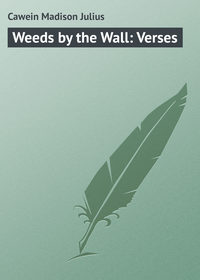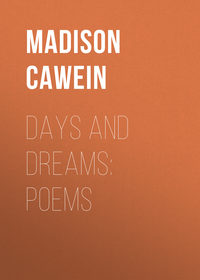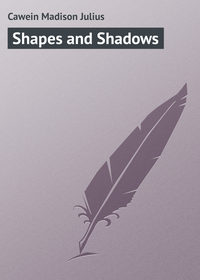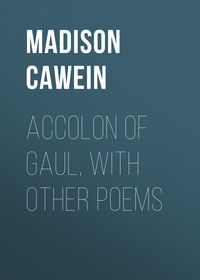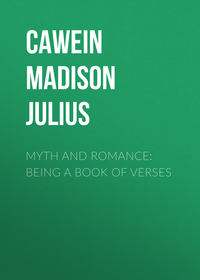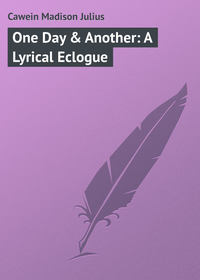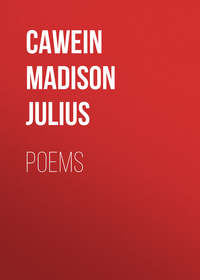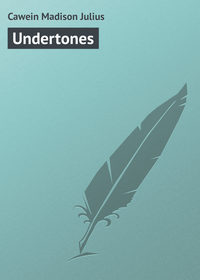The Poems of Madison Cawein. Volume 2 (of 5)
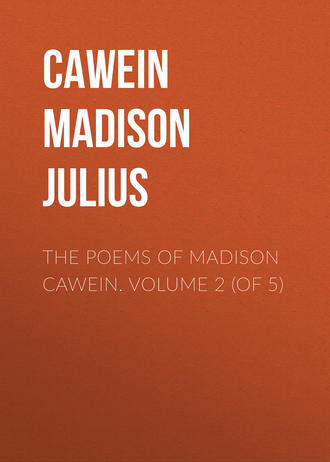 полная версия
полная версияThe Poems of Madison Cawein. Volume 2 (of 5)
Жанр: зарубежная поэзиязарубежная классиказарубежная старинная литературастихи и поэзиясерьезное чтениеcтихи, поэзия
Язык: Английский
Год издания: 2018
Добавлена:
Настройки чтения
Размер шрифта
Высота строк
Поля
III
Below the sunset’s range of rose,Below the heaven’s bending blue,Down woodways where the balsam blows,And milkweed tufts hang, gray of hue,A Jersey heifer stops and lows—The cows come home by one, by two.There is no star yet: but the smellOf hay and pennyroyal mixWith herb-aromas of the dell;And the root-hidden cricket clicks:Among the ironweeds a bellClangs near the rail-fenced clover-ricks.She waits upon the slope besideThe windlassed well the plum-trees shade,The well-curb that the goose-plums hide;Her light hand on the bucket laid,Unbonneted she waits, glad-eyed,Her dress as simple as her braid.She sees fawn-colored backs amongThe sumacs now; a tossing horn;A clashing bell of brass that rung:Long shadows lean upon the corn,And all the day dies scarlet-stung,The cloud in it a rosy thorn.Below the pleasant moon, that tipsThe tree-tops of the hillside, flyThe evening bats; the twilight slipsSome fireflies like spangles by;She meets him, and their happy lipsTouch; and one star leaps in the sky.He takes her bucket, and they speakOf married hopes while in the grassThe plum lies glowing as her cheek;The patient cows look back or pass;And in the west one golden streakBurns like a great cathedral glass.IV
The skies are amber, blue, and greenBefore the coming of the sun;And all the deep hills sleep, sereneAs if enchanted; every oneIs ribbed with morning mists that leanOn woods through which vague whispers run.Birds wake: and on the vine-hung knobs,Above the brook, a twitteringConfuses songs; one warbler robsAnother of its note; a wingBeats by; and now a wild throat throbsTriumphant; all the woodlands sing.The sun is up: the hills are heapedWith instant splendor; and the valesSurprised with shimmers that are steepedIn purple where the thin mist trails;The water-fall, the rock it leaped,Are burning gold that foams and fails.He drives his horses to the plowAlong the vineyard slopes, where baskDew-heavy grapes, half-ripened now,In sun-shot shafts of shade: no maskOf joy he wears; his face and browGlow as he enters on his task.Before him, soaring through the mist,The gray hawk wildly wings and screams;Its dewy back gleams, sunbeam-kissed,Above the wood that drips and dreams;He guides the plow with one strong fist;The soil rolls back in level seams.Packed to the right the sassafrasLifts leafy walls of spice that shadeThe blackberries, whose tendrils massBig berries in the coolness made;And drop their ripeness on the grassWhere trumpet-flowers fall and fade.White on the left the fence and treesThat mark the garden; and the smoke,Uncurling in the early breeze,Tells of the roof beneath the oak;He turns his team, and, turning, seesThe damp, dark soil his coulter broke.Bees hum; and o’er the berries poiseLean-bodied wasps; loud blackbirds turnFollowing the plow: there is a noiseOf insect wings that buzz and burn;—And now he hears his wife’s low voice,The song she sings to help her churn.V
There are no clouds that drift aroundThe moon’s pearl-kindled crystal, (whiteAs some sky-summoned spirit woundIn raiment lit with limbs of light),That have not softened like the soundOf harps when Heaven forgets to smite.The vales are deeper than the dark,And darker than the vales the woodsThat shadowy hill and meadow markWith broad, blurred lines, whereover broodsDeep calm; and now a fox-hound’s barkUpon the quietude intrudes.And though the night is never still,Yet what we name its noises makesIts silence:—now a whippoorwill;A frog, whose hoarser tremor breaksThe hush; then insect sounds that fillThe night; an owl that hoots and wakes.They lean against the gate that leadsInto the lane that lies betweenThe yard and orchard; flowers and weedsSmell sweeter than the odors keenThat day distils from hotness; beadsOf dew make cool the gray and green.Their infant sleeps. They feel the peaceOf something done that God has blessed,Still as the pulse that will not ceaseThere in the cloud that lights the west:The peace of love that shall increaseWhile soul to soul still gives its best.AN EPIC OF SOUTH-FORK
I
The wild brook gleams on the sand and ripplesOver the rocks of the riffle; brimmingUnder the elms like a nymph who dripples,Dips and glimmers and shines in swimming:Under the linns and the ash-trees lodging,Loops of the limpid waters lie,Shaken of schools of the minnows, dodgingThe glancing wings of the dragon-fly.Lower, the loops are lines of laughterOver the stones and the crystal gravel;Afar they gloom, like a face seen afterMirth, where the waters slowly travel;Shadowy slow where the Fork is shakenOf the dropping bark of the sycamore,Where the water-snake, that the footsteps waken,Slides like a crooked root from shore.Peace of the forest; and silence, dimmerThan dreams. And now a wing that winnowsThe willow leaves, with their shadows slimmerIn the shallow there than a school of minnows:Calm of the creek; and a huge tree twisted,Ringed, and turned to a tree of pearl;A gray-eyed man, who is farmer-fisted,And a dark-eyed, sinewy country girl.The brow of the man is gnarled and wrinkledWith the weight of the words that have just been spoken;And the girl has smiled and her eyes have twinkled,Though the bonds and the bands of their love lie broken:She smiles, nor knows how the days have knottedHer to the heart of the man who says:“Let us follow the paths that we think allotted.I will go my ways and you your ways.“And the man between us is your decision.Worse or better he is your lover.—Shall I say he ’s worse since the sweet ElysianPrize he wins where I discoverOnly the hell of the luckless chooser?—Shall I say he ’s better than I, or more,Since he is winner and I am loser,His life ’s made rich and mine made poor?”“I tell you now as I oft and everHave told,” she answered, the laughter dyingDown in her eyes, “that his arms have neverHeld me!—no!—but you think me lying,And you are wrong. And I think it betterTo part forever than still to dwellWith the sad distrust, like an evil tetter,On our lives forever, and so farewell.”And she turned away; and he watched her going,The girlish pride in her eyes a-smoulder:He saw her go, and his lips were glowingFever that parched. And he stood, one shoulderSlouched to the tree; and he saw her stooping,There by the bank, with a reckless foot;Straighten; and tear from her breast his droopingLilies and fasten the pleurisy-root.With its orange fire he saw her passingOn and on; and the blood beat, burningHis brain to madness; and seemingly massingThe weight of the world on his heart in yearning …Butterflies swarmed in the moist sand-alleys;A fairy fleet of Ionian sailsThey seemed with their wings, or of pirate galleys,Maroon and yellow, for Elfland gales.He watched her going; and harder, thickerThe pulse of his breath and his heart’s hard throbbing.—How should he know that her heart was sicker?How should he know that her soul was sobbing?—She never looked back: and he saw her vanishIn swirls of the startled butterflies,Like a storm of flowers; and he could not banishThe thought he had lost his all through lies.II
He heard the cocks crow out the lonely hours.How long the night! how far away the dawn!It seemed long months since he had seen the flowers,The leaves, the sunlight, and the bee-hived lawn;Had heard the thrush flute in the tangled showers.His burning eyes ached, staring at the blackStolidity of midnight. Would God sendNo cool relief unto his mind,—a rackOf inquisition,—tortures to unbend,That stretched him forward and now strained him back?Incomprehensible and undivulged,The thought that took him back, retraced their walks,Through woods, on which the sudden perfumes bulged,The bird-songs and the brilliant-blossomed stalks;And all the freedom which their talk indulged.Oh, strong appeal! And he would almost yield;When, firmly forward, he could feel her faultOppose the error of a rock-like shield,And to resisting phalanxes cry halt—And, lo! bright cohorts broken on the field.O mulct of morning! to the despot nightCount down unminted gold, and let the dayWalk free from dungeons of the dark; delightHerself on mountains of the violet ray,Clad in white maidenhood and morning white!A melancholy coast, plunged deep in dreamAnd death and silence, stretched the drowsy dark,Wherein he heard a round-eyed screech-owl scream,In lamentation, and a watch-dog bark,Vague as oblivion, lost in night’s deep stream.And then hope moved him to divide the blindsTo see if those bright sparkles were a star’s,Or but his feverish eyelids, which the mind’sCommotion weighed.—No hint of morning barsWith glimmer heaven’s swart tapestry he finds.So he remained, impatient, till the firstExploring crevices of Aztec morn,Dim cracks of treasure, Eldorados burst:Then could he face his cowardice and scornHis jealousy that thus his life had cursed.Love knew no barriers now. And where he wentEach woodland path was musical with birds;Each flow’r was richer, more divine of scent;For love sought love with such expressive wordsThat dawn’s delivery was less eloquent.III
Who is it hunts with his dogThere where the heron is flyingGray through the feathering fogOver the Fork, where is lying,Bridge-like, a butternut log,There where the horsemint is drying?Who is it hunts in the brush,Under the linns and the beeches,Here where the water-falls rush,Dark, where the noon never reaches?Here where the Fork is one crushOf flags with a bloom like the peach’s?He is handsome and supple and tall,Blond-haired and vigorous-chested,Blue-eyed as the bud by the fallWhere he listens,—his rifle half rested,Half leaned on the crumbling stone wall,—Whose briers he lately has breasted.He waits; and the sun on the dewOf the cedars and leaves of the bushesStrikes glittering frostiness through …If a covey of partridges flushesWhat good will a Winchester do,Or the dog to his feet that he crushes?Then a man breaks strong through the weedsWhere the buck-bushes toss and the spiresOf the white-blossomed cohosh; ’mid reedsWild-carrots, and trammelling briers:It is he! to his loved one who speeds—And the man in the bushes—he fires....From leaves of the wind-shaken woodThe dew of the dawn is still falling:He is gone from the place where he stood,Just there where the black crow is calling:There is blood on the weeds: is it bloodOn the face of the man who is crawling?Red blood or a smudge of the dawn?—Now he lies with his gray eyes wide, staring,Stiff, still at the sun: he has drawnHis limbs in a heap: and the faringBee-martins light near or pass on,Not one of them knowing or caring.It is noon: and the wood-dove is deepIn the calm of its cooing: and overThe tops of the forest trees sweepThe shadows of buzzards that hover:Wide-winged they sail on as asleep:And the bob-white is whistling from cover.It is dusk: and the heat, that made wiltThe leaves and the wildflowers’ faces,Gives place to the dew-drops that tiltWith coolness the weeds where are tracesOf horror and darkness and guilt,That nothing can wash from those places.It is night: and the hoot-owlet mocksThe dove of the day with wild weeping,The Fork is scarce heard on its rocksWhere the man is so quietly sleeping:Through the woods snaps the bark of a fox;The lightning is fitfully leaping.IV
All day, ’twixt hope and fear,She waited at the gate,Looking for him, more dearNow that he made her wait:Day went and night draws near:Stormy it grows and late.Still, still she waits: great limbsThe winds rend from the ridge;Each swollen shallow swimsHead-deep below the bridge;The drift, that breaks and brimsSwirls lighter than the midge.The night grows wildly grayWith lightning-litten rain;The forests sound and sway,An oak is rent in twain;The thunder rolls awayLike some vast bolt and chain.The Fork is whirling wreckOf field and farm and wood;And many a foaming fleckDrives where the rock-fence stood;—A torrent sweeps break-neckAbove the washed-out blood.Night deepens: still she waitsExpectant in despair:The Fork has reached the gates,The wood’s wreck everywhere.But when the storm abates,She thinks, he will be there.She sees the lightning rushIts blazing hells above;She hears the thunder crushHeaven as if earthquake-clove—Loud in the tempest’s hushShe calls with all her love.He comes, she feels; and standsThe rushing waters o’erHer feet, and on her handsAnd hair the wild down-pour,The lightnings are wild brandsTo light him to her door.Night deepens: but she knowsGod will not fail to sendHer love to soothe her woes,And one day’s errors mend.—The wild stream foams and flowsBooming in fall and bend.Again the lightnings lightThe night like some wild torch;The waters foam and fight;And one uprooted larchSweeps down, with something whiteWedged in it, by her porch.She stoops: the lurid rainBeats on her back and head—Ay! he hath come again!With livid lips once red!A bullet in his brainThe night hath brought him—dead!A NIELLO
I
It is not early spring and yetOf bloodroot blooms along the stream,And blotted banks of violet,My heart will dream.Is it because the wind-flower apesThe beauty that was once her brow,That the white thought of it still shapesThe April now?Because the wild-rose learned its blushFrom her fresh cheeks of maidenhood,Their thought makes June of barren brushAnd empty wood?And then I think how young she died—Straight, barren death stalks down the trees,The hard-eyed hours by his sideThat kill and freeze.II
When orchards are in bloom againMy heart will bound, my blood will beat,To hear the red-bird so repeat,On boughs of rosy stain,His blithe, loud song,—like some far strainFrom out the past,—among the bloom,—(Where bee, and wasp, and hornet boom)—Fresh, redolent with rain.When orchards are in bloom once more,Invasions of lost dreams will drawMy feet, like some insistent law,Through blossoms to her door:In dreams I’ll ask her, as before,To let me help her at the well;And fill her pail; and long to tellMy love as once of yore.I shall not speak until we quitThe farm-gate, leading to the laneAnd orchard, all in bloom again,’Mid which the wood-doves sitAnd coo; and through whose blossoms flitThe cat-birds crying while they fly:Then tenderly I’ll speak, and tryTo tell her all of it.And in my dream again she’ll placeHer hand in mine, as oft before,—When orchards are in bloom once more,—With all her old-time grace:And we will tarry till a traceOf sunset dyes the heav’ns; and then—We’ll part, and, parting, I againWill bend and kiss her face.And homeward, dreaming, I will goAlong the cricket-chirring ways,While sunset, like one crimson blazeOf blossoms, lingers low:And my lost youth again I’ll know,And all her love, when spring is here—Hers! hers! now dead this many a yearWhose love still haunts me so.III
I would not die when Springtime liftsThe white world to her maiden mouth,And heaps its cradle with gay gifts,Breeze-blown from out the singing South:Too full of life and loves that cling,Too heedless of all mortal woe,The young, unsympathetic Spring,That death should never know.I would not die when Summer shakesHer daisied locks below her hips,And, naked as a star that takesA cloud, into the silence slips.Too rich is Summer; poor in needs;Wrapped in her own warm lovelinessHer pomp goes by, and never heedsIf one be more or less.But I would die when Autumn goes,The sad rain dripping from her hair,Through forests where the wild wind blowsDeath and the red wreck everywhere:Sweet as love’s last farewells and tears’T would be to die, when heavens are gray,In the old autumn of my years,Like a dead leaf borne far away.DEEP IN THE FOREST
I
SPRING ON THE HILLSAh, shall I follow, on the hills,The Spring, as wild wings follow?Where wild-plum trees make wan the hills,Crab-apple trees the hollow,Haunts of the bee and swallow?In red-bud brakes and floweryAcclivities of berry;In dogwood dingles, showeryWith dew, where wrens make merry?Or drifts of swarming cherry?In valleys of wild-strawberries,And of the clumped May-apple;Or cloud-like trees of hawberries,With which the south-winds grapple,That brook and pathway dapple?With eyes of far forgetfulness,—Like some white wood-thing’s daughter,Whose feet are bee-like fretfulness,—To see her run like waterThrough boughs that slipped or caught her.O Spring, to seek, yet find you not,To search and still continue;To glimpse, to touch, but bind you not,To lose and then to win you,All sweet evasion in you.In pearly, peach-blush distancesYou gleam; the woods are braidedOf myths, of dream-existences;—There, where the brook is shaded,Some splendor surely faded.O presence, like the primrose’s,Once more I feel your power!In rainy scents of dim rosesI breathe you for an hour,Elusive as a flower.II
THE WOOD SPIRITAh me! I still rememberHow flushed, before the shower,The dusk was; like a scarlet rose,Or blood-red poppy-flower.Now heaven is starred; the moonlightLays blurs upon the grain—You may not know it from white frost,The moonlight on the rain.And all the forest uttersA restless moan in rest,For all the deep, dark shadow liesLike iron on its breast.I mark the moveless shadow,I mark the unreaped corn,Then something whispers overhead,“Come to me, mortal-born.”I sit alone and listen;The low leaves sound and sigh;The dew drips from the bearded grain,A mist slips from the sky.—I hear her whisper, whisper,And breathe in some dim place;Her feet are easier than the dew,And than the mist her face.I may not clasp her ever,This spirit made for song,Who dwelleth in the young, young oakThe old, old oaks among.Her limbs are molded moonlight;Her breasts are silver moons:She glimmers and she glitters whereThe purple shadow swoons.And since she knows I love her,She says my soul has died,And laughs and mocks me in the mistThat haunts the forest-side.When winds run mad in woodlandsAnd all the great boughs swing,I see her wild hair blow and blowBlack as a raven’s wing.When winds are tamed and tetheredAnd stars are keen as frost,I search and seek within the wood,There where my soul was lost.I seek her, and she flies me;I follow; and the wholeDim woodland echoes with her voice,Soft calling to my soul.III
OWL ROOSTThe slope is a mass of vines:If you walk in the daylight there,A gleam as of twilight shinesThrough the vines massed everywhere:Each trunk, that a creeper twines,Is a column, strong to bearThe dome of its leaves that wave,Cathedral-dim and grave.Black moss makes silent the feet:And, above, the fox-grapes laceSo thick that the noonday heatIs chill as a murdered face:And the winds for miles repeatThe fugue of a rolling bass:The deep leaves twinkle and turnBut over no flower or fern.An angular spider weavesGreat webs between the trees,Webs that are witches’ sieves:And honey-and bumblebeesGo droning among the leaves,Like the fairies’ oboës:At dark the owlets croonTo the stars and the sickle-moon.At dark I will not goThere where the branches sigh;Where naught but the glow-worms glow,Each one like a demon’s eye:O’er which, like a battle-bow,With an arrow that it lets fly,The new-moon and one starHang and glimmer afar.At dawn, if my mood be dim,And the day be a cloudless one,There where the sad winds hymnI ’ll walk, but its shade will shun;Its shade, where I feel the grimHorror of something doneHere in the years long past,That the place conceals to the last.IV
MOSS AND FERNWhere rise the brakes of bramble there,Wrapped with the trailing rose,Through cane where waters ramble, thereWhere deep the green cress grows,Who knows?Perhaps, unseen of eyes of man,Hides Pan.Perhaps the creek, whose pebbles makeA foothold for the mint,May bear,—where soft its trebles makeConfession,—some vague hint—(The print,Goat-hoofed, of one who lightly ran)—Of Pan.Where, in the hollow of the hillsFerns deepen to the knees,What sounds are those above the hills,And now among the trees?—No breeze!—The syrinx, haply, none may scan,Of Pan.In woods where waters break uponThe hush like some soft word;Where sun-shot shadows shake uponThe moss, who has not heard—No bird!—The flute, as breezy as a fan,Of Pan?Far in, where mosses lay for usStill carpets, cool and plush;Where bloom and branch and ray for usSwoon in the noonday flush,The hushMay sound the satyr hoof a spanOf Pan.In woods where thrushes sing to us,And brooks dance sparkling heels;Where wild aromas cling to us,And all our worship kneels,—Who stealsUpon us, haunch and face of tan,But Pan?V
WOODLAND WATERSThrough leaves of the nodding trees,Where blossoms sway in the breeze,Pink bag-pipes made for the bees,Whose slogan is droning and drawling:Where the columbine scatters its bells,And the wild bleeding-heart its shells,O’er mosses and rocks of the dellsThe brook of the forest is falling.You can hear it under the hillWhen the wind in the wood is still,And, strokes of a fairy drill,Sounds the bill of the yellow-hammer:By the solomon’s-seal it slips,Cohosh and the grass that drips—Like the words of an Undine’s lips,Is the sound of its falls that stammer.I lie in the woods: and the scentOf the honeysuckle is blentWith the sound: and a Sultan’s tentIs my dream, with the East enmeshéd:—A slave-girl sings; and I hearThe languor of lute-strings near,And a dancing-girl of CashmereIn the harem of good Er Reshid.From ripples of Irak laceShe flashes the amorous graceOf her naked limbs and her face,While her golden anklets tinkle:Then over mosaic floorsOpen seraglio doorsOf cedar: by twos, by fours,—Like stars that tremble and twinkle,—While the dulcimers sing, unseen,The handmaids come of the Queen’Neath silvern lamps, one sheenOf jewels of Afrite treasure:And I see the Arabia riseOf the Nights that were rich and wise,Beautiful, dark, in the eyesOf Zubeideh, the Queen of Pleasure.VI
THE THORN-TREEThe night is sad with silver and the day is glad with gold,And the woodland silence listens to a legend never old,Of the Lady of the Fountain, whom the fairy people know,With her limbs of samite whiteness and her hair of golden glow,Whom the boyish South-wind seeks for and the girlish-stepping rain,Whom the sleepy leaves still whisper men shall never see again;She whose Vivien charms were mistress of the magic Merlin knew,That could change the dew to glow-worms and the glow-worms into dew.There’s a thorn-tree in the forest, and the fairies know the tree,With its branches gnarled and wrinkled as a face with sorcery;But the May-time brings it clusters of a rainy fragrant white,Like the bloom-bright brows of beauty or a hand of lifted light.And all day the silence whispers to the sun-ray of the mornHow the bloom is lovely Vivien and how Merlin is the thorn:How she won the doting wizard with her naked lovelinessTill he told her demon secrets that but made his magic less.How she charmed him and enchanted in the thorn-tree’s thorns to lieForever with his passion that should never dim or die:And with wicked laughter looking on this thing that she had done,Like a visible aroma lingered sparkling in the sun;How she stooped to kiss the pathos of an elf-lock of his beard,All in mockery, at parting, and mock pity of his weird:But her magic had forgotten that “who bends to give a kissWill bring down the curse upon them of the person whose it is”:So the silence tells the secret.—And at night the fairies seeHow the tossing bloom is Vivien, who is struggling to be free,In the thorny arms of Merlin, who, forever, is the tree.VII
THE HAMADRYADShe stood among the longest fernsThe valley held; and in her handOne blossom like the light that burns,Vermilion, o’er a sunset land;And round her hair a twisted bandOf pink-pierced mountain-laurel blooms:And darker than dark pools, that standBelow the star-communing glooms,Her eyes beneath her hair’s perfumes.I saw the moon-pearl sandals onHer flower-white feet, that seemed too chasteTo tread pure gold: and, like the dawnOn splendid peaks that lord a wasteOf solitude lost gods have graced,Her face: she stood there, faultless-hipped,Bound with the cestused silver,—chasedWith acorn-cup and crown, and tippedWith oak-leaves,—whence her chiton slipped.Limbs that the gods call loveliness!—The grace and glory of all GreeceWrought in one marble form were lessThan her perfection!—’Mid the treesI saw her; and time seemed to ceaseFor me—And, lo! I lived my oldGreek life again of classic ease,Barbarian as the myths that rolledMe back into the Age of Gold.WRECKAGE
I
Love and the drift of many dreams,Under the moon of a Florida night,Over the beach with its silvery seamsWhite as a sail is white.Love that entered into two livesOut of the dreams that the nights have borne,Over the waves where the vapor drives,Mists that the stars have torn.Love that welded two hearts and handsThere by the sea, ’neath the shell-white moon,Like to the stars and the mists and the sandsSetting two lives in tune.Nights of love that one still keepsSacred;—nights, that the faith of oneHeartened there in the treacherous deeps,Under a tropic sun.

